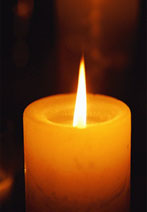September, 2004
Prayer's Hardships
by Thomas Merton
Some people doubtless have a spontaneous gift for meditative prayer. This is unusual today. Most people have to learn how to meditate. There are ways of meditation. But we should not expect to find magical methods -- systems -- which make all difficulties and obstacles dissolve into thin air. Meditation is sometimes quite difficult. If we bear with hardship in prayer and wait patiently for the time of grace, we may well discover that meditation and prayer are very joyful experiences. We should not, however, judge the value of our meditation by "how we feel." A hard and apparently fruitless meditation may in fact be much more valuable than one that is easy, happy, enlightened and apparently a big success.
There is a "movement" of meditation, expressing the basic "paschal" rhythm of the Christian life, the passage from death to life in Christ. Sometimes prayer, meditation and contemplation are "death" -- a kind of descent into our own nothingness, a recognition of helplessness, frustration, infidelity, confusion, ignorance. Note how common this theme is in the Psalms (see 56, 39). If we need help in meditation we can turn to scriptural texts that express this profound distress of humanity in its nothingness and total need of God. Then as we determine to face the hard realities of our inner life, as we recognize once again that we need to pray hard and humbly for faith, he draws us out of darkness into light -- he hears us, answers our prayer, recognizes our need, and grants us the help we require -- if only by giving us more faith to believe that he can and will help us in his own time. This is already a sufficient answer.
Taken from Contemplative Prayer by Thomas Merton (New York: Doubleday, 1971).
|


